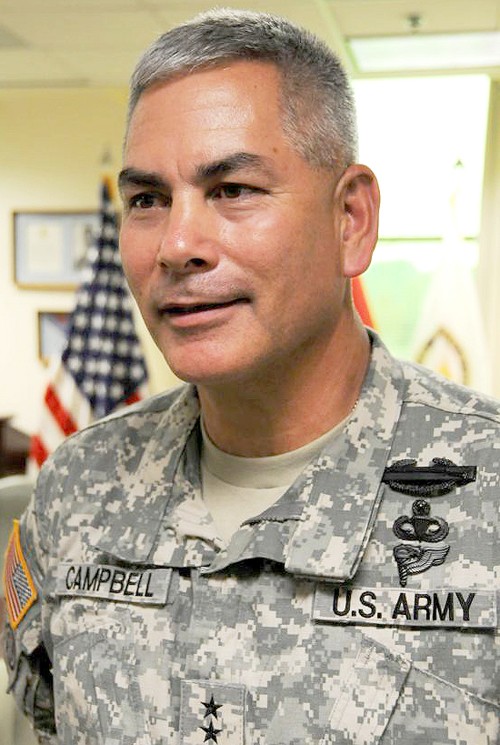WEST POINT, N.Y. (March 9, 2011) -- Thousands of miles away, a group of Army officers spoke loud and clear to a group of soon-to-be lieutenants Feb. 28 at West Point.
From Bagram Airfield in Afghanistan, six combat veterans shared lessons learned and practical advice through a video teleconference, led by Maj. Gen. John F. Campbell, commanding general of the 101st Airborne Division (Air Assault) and commander of NATO coalition forces in eastern Afghanistan.
Campbell read an e-mail from a Soldier wounded in combat who, despite having lost both legs, wanted nothing more than to credit his training, his gear and the 101st for saving his life. It's a good example, Campbell said, of the kind of Soldier these future officers will be leading and for whom they'll make life and death decisions.
The Class of 1979 graduate offered his personal top ten list, starting with living the Army values and emphasizing integrity and personal courage. The list included maintaining rock-solid physical fitness ("You can't lead where you can't go") and practicing lifelong learning.
"You always have to make a commitment to continue learning and seek out opportunities," Campbell said. "Get focused on those things you're not going to master at West Point. Get to specialty schools. Be well-read on counterinsurgency. Afghanistan is the fight now and we'll be here for awhile. Be culturally aware of this country."
He also stated advice repeated by all the officers present: Trust your NCOs and invest in the relationship with your platoon sergeant.
West Point Class of 2011 Cadet Andrew Wheeler took this message to heart.
"It's valuable because NCOs have experience that cannot be matched by any amount of schooling," Wheeler said. "We must consult with them and learn from them if we want to be able to make effective command decisions."
Echoing the message Defense Secretary Robert Gates delivered Feb. 25 to the Corps of Cadets, Campbell said it was important for young officers to be able to adjust and improvise to any challenge and share lessons learned.
"No one can be trained and educated to have all the right answers," Campbell said.
Capt. John McLean is a Class of 2004 graduate who branched aviation. Since then he has had two years experience as a platoon leader, served as a staff officer conducting operations and assisting in developing tactical plans in Iraq. He has served the last 18 months as a line company commander in both Afghanistan and Iraq.
"The challenge you have is that you're pretty much guaranteed to show up and take charge of an entire platoon of combat vets," McLean said. "There'll be a few new privates in your formations, but you'll be overwhelmed by the experience standing in front of you. Don't take this lightly and don't take it as a challenge to your authority. You will step in and be in charge. Rely on that experience and use it to grow."
During stressful operations and heavy conflict, Soldiers will rely on their training.
"They'll do what they were trained to do, so it's on you to ensure that training is conducted to standard," McLean said.
Knowing their zeal to lead troops after graduation, the officers told cadets not to discredit staff assignments and recognize the value of gaining different experience.
Capt. Chris Tanner, Class of 2006, was a rifle platoon leader in Iraq and will soon assume company command. Tanner has been working on division staff as a liaison officer for Task Force Currahee.
"Staff (assignments) are a great opportunity to see the battlefield from two or three levels above, and you really realize what you don't know," Tanner said. "On staff, you see a whole lot going on that you need to understand how it works."
Class of 2011 Cadet Lauren Looper said the VTC was a good reminder of the responsibility they'll soon possess after becoming commissioned officers.
"I enjoyed getting to listen to officers whose sole focus right now is Afghanistan because they bring a different perspective," the future engineer officer said. "(It was useful) because we had a wide array of young officers who are in a fight that we will eventually be joining."
As a future infantry officer assigned to Schofield Barracks, Hawaii, Wheeler appreciated the real-time insight into the challenges and complexities the officers face in Afghanistan.
"...but the conditions are dynamic on the ground so hearing it from officers who are currently there has an added value," Wheeler said.
The video teleconference was provided to more than 500 cadets enrolled in MX400, West Point's Capstone Course for Officership, the Simon Center for the Professional Military Ethic. The course provides all firsties a rigorous, interdisciplinary experience to complete initial development of their personal and professional identity and their self concept of officership as a leader of character.
The course interweaves three broad, interrelated themes-battle command, military professionalism and military leadership. This is a fundamental graduation requirement so they can best fulfill the trust placed in them in commanding and leading Soldiers in combat.
Lt. Col. Michael Turner, MX400 course director, said the program focuses on three learning philosophies: learning from others' experiences, learning from personal experiences and learning through self-study.
"The VTC utilizes that first philosophy where cadets benefit from the experiences of leaders currently in the fight and learn what is expected of junior leaders," Turner said.
The course also prepares cadets for officership through tactical decision games and a platoon leader challenge using resources from the Center for Company Level Leaders.
Turner, a Class of 1987 graduate, said the Class of 2011 will attend a Battle Command Conference, April 19-20, to personally interact with more than 125 recent combat veteran officers and NCOs as a culminating event in their development as future officers.
"It's that last big event before graduation where the firsties can engage directly with individuals who are doing what (the graduating cadets) are about to be doing, and learn from their experiences," Turner said.


Social Sharing